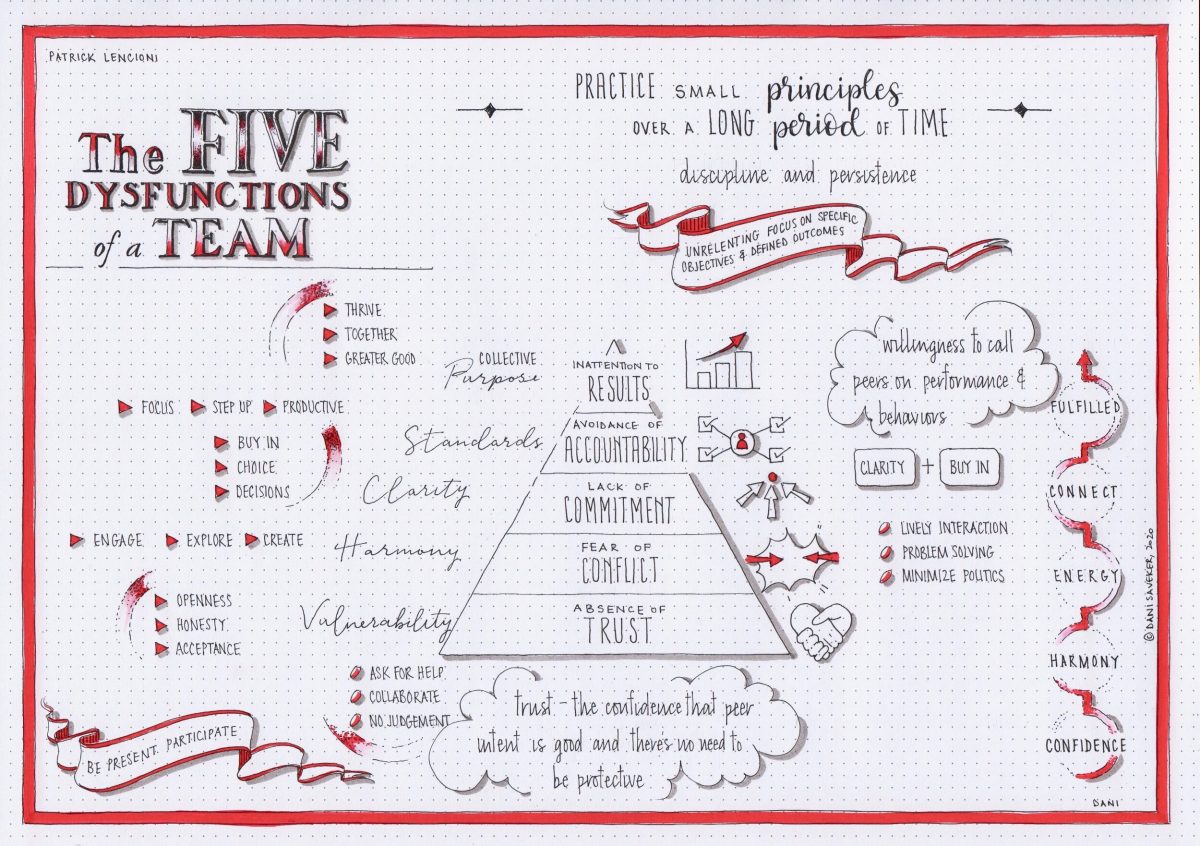Article
Confronting 5 Traits of Dysfunctional Teams
Jeff Mingee
How do I avoid my team becoming dysfunctional? If it is dysfunctional, what do I do?

Illustration © Dani Saveker
How do I start my team off right so it never becomes a dysfunctional team? How do I know if my team is dysfunctional? If it is, what do I do?
Teamwork makes the dream work. But teamwork also can turn the dream into a nightmare. Visions of prayerful launch team meetings fade into the reality of contentious disagreements on how often to serve communion or which worship artists should be banned from your services. The idea of a plurality of elders is great – until you have a plurality of elders who disagree with you.
The Fall of Teams
Christians shouldn’t be surprised when we experience conflict and dysfunction in our teams. The sinfulness of the human heart causes havoc in both our relationship with God and our relationship with others. Your church planting team is not immune to the consequences of sin.
In his book Five Dysfunctions of a Team, business leader Patrick Lencioni reveals five key actions and attitudes that cause teams to breakdown. Each of these dysfunctions is an echo of Genesis three and the results of sin:
- Absence of trust seen in refusing to be vulnerable – After Adam and Eve sinned, they tried to cover themselves with fig leaves. They were unwilling for the “naked truth” to be known about them. In the same way, teams today are filled with individuals who struggle with vulnerability and trust.
- Fear of conflict seen in artificial harmony – Fear entered the world in Genesis 3. Instead of disagreeing graciously and compassionately, after the first sin Adam and Eve feared the graceless conflict that would ensue. Similarly, teams today often are characterized by artificial harmony, instead of the willingness to disagree graciously.
- Lack of commitment seen in ambiguity – Ambiguity is the language of unfulfilled promises. “It’ll get done.” “Mistakes were made.” Ever since Genesis 3, we’ve avoided commitment by hiding in the shadows. The gospel, however, is not advanced ambiguously but by real people going to real places.
- Avoidance of accountability seen in low standards – After the first sin, God found Adam and Eve hiding in the bushes. We’ve been hiding ever since. Even when we’re working together in teams, we hide in our avoidance of accountability.
- Inattention to results seen in concern for status and ego – The serpent appealed to Eve’s ego. He’s covered a lot of ground since then by appealing to ours as well. Rather than attention to the results of the team, we’re often more concerned with our individual stats.1
Laying a Healthy Foundation
So, what’s a leader to do? Should we abandon the concept of teamwork and go at it alone? No, that won’t do. Should we fill our teams with “yes men” who will give the appearance of plurality without the conflict of disagreement? No, we need honesty. We must find a healthy way.
The gospel, the good news – that Christ died for our sins in accordance with the Scriptures, that he was buried and on the third day rose again in accordance with the Scripture – both frees us for teamwork and compels us to teamwork. The gospel liberates us from the fears and insecurities that cause us to hide in isolation. It demands that we work with – even love – others to obey God’s commands and make disciples.
Consider how you might confront Lencioni’s five dysfunctions with a healthy gospel culture:
- Absence of trust seen in refusing to be vulnerable – Because you have God’s full approval in Christ, you can be vulnerable with your team. This doesn’t mean you abandon discretion and share everything with everybody, regardless of trust levels. It does mean that you set a culture of vulnerability. Admit your mistakes. Confess your sins. Your righteousness is not threatened because you made a poor leadership decision.
- Fear of conflict seen in artificial harmony – The death of Christ satisfied the wrath of God toward you in your sin. If you need not fear conflict with God, why would you fear conflict with another person? A lack of health in leadership may cause some to run from conflict and may cause others to create conflict. Set the pace for your team by pursuing real harmony. Work through the conflict for the unity of the church and the advancement of the gospel. We see Paul model this in Galatians 2.
- Lack of commitment seen in ambiguity – Church planters can get away with ambiguity – for a while. “Working on the vision.” “Strategically thinking about locations.” “Brainstorming evangelism strategies.” Eventually, however, the work calls you to commit. The discussion of planting a church must give way to an announcement, the risk of fundraising, choosing a location and the appointment of leaders. Allow your team to wrestle with ambiguity in discussions but take the lead, make a decision and keep clear commitments.
- Avoidance of accountability seen in low standards – Dysfunctional church planting teams will constantly chalk up their failures to “well, we’re church planting.” As though established churches have no struggles! A dysfunctional team will repeatedly come up with excuses when God is calling them to repentance. Raise the bar. Hold yourself and your team to a higher standard of excellence. The gospel is not honored by sloppy saints or disorganized teams. See Paul’s charge to Titus in Titus 1:5.
- Inattention to results seen in concern for status and ego – “Church planter.” The very title carries a certain weight and maverick honor. I’m not just a pastor; I’m a church planter. I’m not merely in ministry; I’m in church planting. If you’re not careful, you’ll get so caught up in being a “church planter” that you’ll fail to do the actual work of starting a church. Yes, church planting can be a great place for ego. So watch yourself carefully. Surround yourself with others who will pay attention to both you and the results – and who will call you out on both.
Teamwork matters to God. Every page of Scripture testifies to God’s work in and through the context of teams. This means the devil also is at work in and through teams. He’s whispering lies in between meetings and creating doubt and distrust among those on your team. So, leader, work to create a gospel culture that guards against the common dysfunctions and helps you enjoy all the benefits God gives us through the gift of teamwork.




